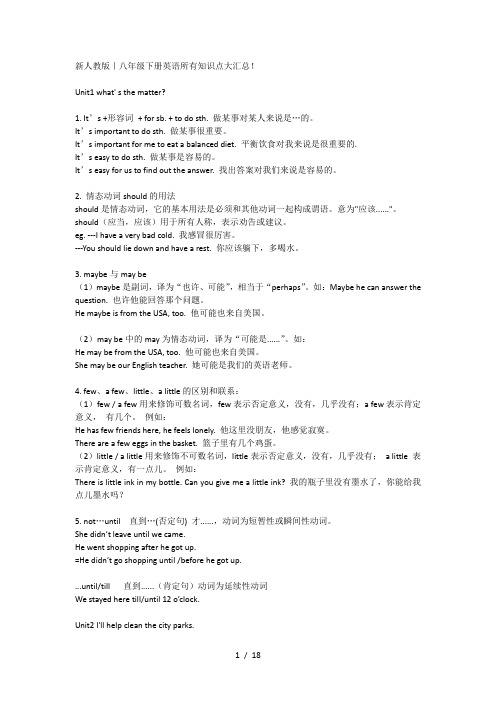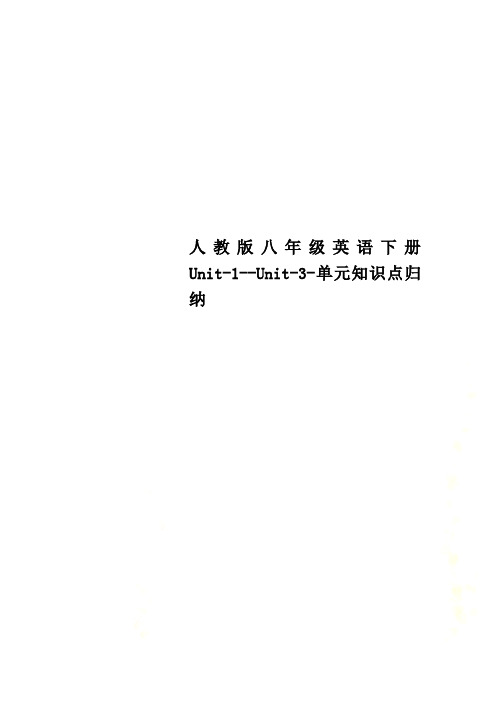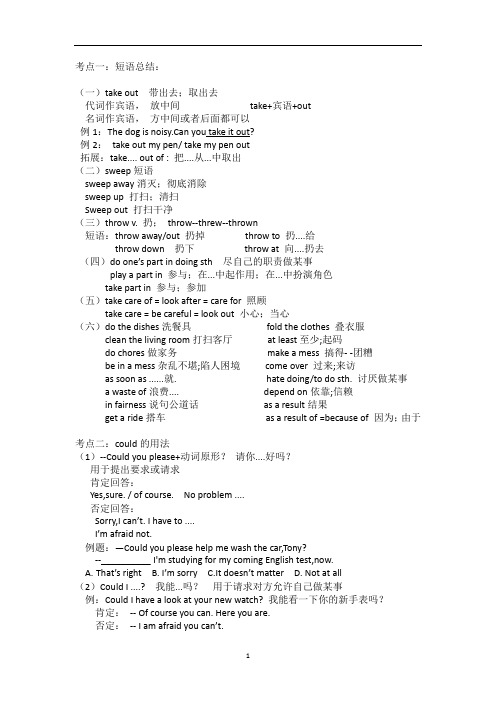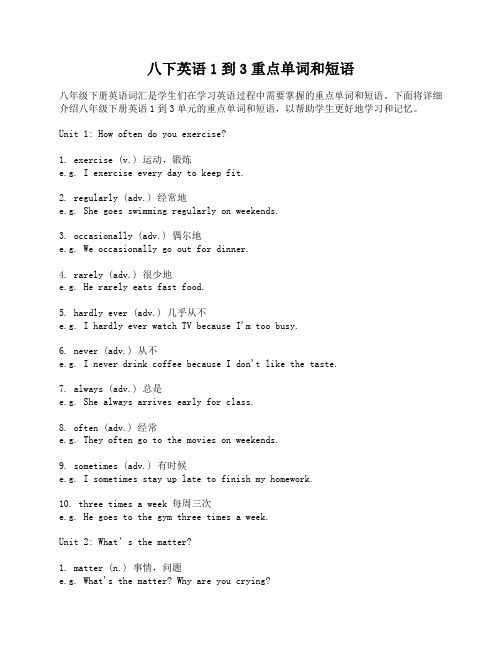最新人教版八年级下册英语unit1-unit3单元知识点
新人教版|八年级下册英语所有知识点大汇总

新人教版|八年级下册英语所有知识点大汇总!Unit1 what' s the matter?1. It’s +形容词+ for sb. + to do sth. 做某事对某人来说是…的。
It’s important to do sth. 做某事很重要。
It’s important for me to eat a balanced diet. 平衡饮食对我来说是很重要的.It’s easy to do sth. 做某事是容易的。
It’s easy for us to find out the answer. 找出答案对我们来说是容易的。
2. 情态动词should的用法should是情态动词,它的基本用法是必须和其他动词一起构成谓语。
意为"应该......"。
should(应当,应该)用于所有人称,表示劝告或建议。
eg. ---I have a very bad cold. 我感冒很厉害。
---You should lie down and have a rest. 你应该躺下,多喝水。
3. maybe与may be(1)maybe是副词,译为“也许、可能”,相当于“perhaps”。
如:Maybe he can answer the question. 也许他能回答那个问题。
He maybe is from the USA, too. 他可能也来自美国。
(2)may be中的may为情态动词,译为“可能是......”。
如:He may be from the USA, too. 他可能也来自美国。
She may be our English teacher. 她可能是我们的英语老师。
4. few、a few、little、a little的区别和联系:(1)few / a few用来修饰可数名词,few表示否定意义,没有,几乎没有;a few表示肯定意义,有几个。
例如:He has few friends here, he feels lonely. 他这里没朋友,他感觉寂寞。
人教版八年级英语下册Unit-1--Unit-3-单元知识点归纳

人教版八年级英语下册Unit-1--Unit-3-单元知识点归纳free【动词】使……解脱,得到自由He could not free his arm.free from21. run out用完,用尽 When his water run out, he knew that he would have to do something to save his own life.物sth. tun out. 某物用尽了。
人sb. run out of物sth..人用尽了某物。
He run out of all his money last night.22.risk sth to do sth. 冒着...的风险去做某事 take a risk=take risks 冒险risk doing ...=take the risk of doing ...23. the importance of (doing) sth.(做)某事的重要性 We students should know the importance of (learning) English.importance n. 重要(性), important adj.重要的,unimportant adj.24.decision 【名词】决定;抉择; make a decision to do sth.decide25. be in the control of …掌管,管理 The headmaster is in the control of this new school. be out of control无法控制,无法管理 be under control被控制住,在控制之中26. 【复习】mind意为介意,Would you mind my opening the window?27. give up (doing) sth. 放弃(做)某事,give up (playing) computer games;give up后可接名词、代词和动词ing形式,也可不接,如 Never give up easily.II. 重点短语1. have a fever 发烧2. have a cough 咳嗽3. have a toothache 牙疼4. talk too much 说得太多5. drink enough water 喝足够的水6. have a cold 受凉;感冒7. have a stomachache 胃疼8. have a sore back 背疼9. have a sore throat 喉咙痛10. lie down and rest 躺下来休息11. hot tea w ith honey 加蜂蜜的热茶12. see a dentist 看牙医13. get an X-ray 拍X 光片14. take one’ s temperature量体温15. put some medicine on sth. 在……上面敷药16. feel very hot 感到很热17. sound like 听起来像18. all weekend 整个周末19. in the same way 以同样的方式20. go to a doctor 看医生21. go along 沿着……走22. on the side of the road 在马路边23. shout for help 大声呼救24. without thinking twice 没有多想25. get off 下车26. have a heart problem 有心脏病27. to one’ s surprise使....... 惊讶的28. thanks to 多亏了;由于29. in time 及时30. save a/one’s life挽救生命lose one's life 31. get into trouble 造成麻烦32. right away 立刻;马上33. because of 由于34. get out of 离开;从……出萍35. hurt oneself 受伤36. put a bandage on sth. 用绷带包扎37. fa ll down 摔倒38. feel sick 感到恶心39. have a nosebleed 流鼻血40. cut his knee 割伤他的膝盖41. put her head back 把她的头向后仰42. have problems breathing 呼吸困难43. mountain climbing 登山运动44. be used to doing sth. 习惯做某事45. run out (of) 用完;用尽46. so that 以便47. so. . . that 如此… …以至于…48. be in control of 掌管;管理49. in a difficult situation 在闲境屮50. keep on doing sth. 继续或坚持做某事51. make a decision 做出决定52. take risks 冒险53. give up 放弃III. 重点语法【反身代词】英语中共有八个反身代词,在使用时应注意和它所指的相应的对象在人称、性别、数上保持一致。
新人教版八年级英语(下册)第三单元知识点总结归纳

新人教版八年级英语(下册)第三单元知识点总结归纳Unit 3: Could you please clean your room?One: "Peter。
could you please take out the rubbish?" - "Sure。
Mom."Could you please do something?" is used to make a request in a polite and indirect manner。
hoping for a positive response。
"Could" is not the past tense of "can," but a more polite way of speaking。
The answer should use "can."Common affirmative responses: "Sure," "Of course," "Certainly," "No problem." Negative responses: "Sorry。
I can't."Two: "Take out" means to remove something (v+adv)。
When using a pronoun as the object。
it goes in the middle。
Witha noun。
it can go in the middle or at the end.Phrases using "take":Take out" means to bring something out or remove it.Please take out a piece of paper."Please take it out."Take。
人教版八年级英语下册Unit3短语归纳+重点考点总结

考点一:短语总结:(一)take out 带出去;取出去代词作宾语,放中间take+宾语+out名词作宾语,方中间或者后面都可以例1:The dog is noisy.Can you take it out?例2:take out my pen/ take my pen out拓展:take.... out of : 把....从...中取出(二)sweep短语sweep away消灭;彻底消除sweep up 打扫;清扫Sweep out 打扫干净(三)throw v. 扔;throw--threw--thrown短语:throw away/out 扔掉throw to 扔....给throw down 扔下throw at 向....扔去(四)do one’s part in doing sth 尽自己的职责做某事play a part in 参与;在...中起作用;在...中扮演角色take part in 参与;参加(五)take care of = look after = care for 照顾take care = be careful = look out 小心;当心(六)do the dishes洗餐具fold the clothes 叠衣服clean the living room打扫客厅at least至少;起码do chores做家务make a mess 搞得--团糟be in a mess杂乱不堪;陷人困境come over 过来;来访as soon as ......就. hate doing/to do sth. 讨厌做某事a waste of浪费.... depend on依靠;信赖in fairness说句公道话as a result结果get a ride搭车as a result of =because of 因为;由于考点二:could的用法(1)--Could you please+动词原形?请你....好吗?用于提出要求或请求肯定回答:Yes,sure. / of course. No problem ....否定回答:Sorry,I can’t. I have to ....I’m afraid not.例题:—Could you please help me wash the car,Tony?--__________ I'm studying for my coming English test,now.A.That’s rightB. I’m sorryC.It doesn’t matterD. Not at all(2)Could I ....? 我能...吗?用于请求对方允许自己做某事例:Could I have a look at your new watch? 我能看一下你的新手表吗?肯定:-- Of course you can. Here you are.否定:-- I am afraid you can’t.(3)表示能力Could表示过去的能力,can表示现在的能力can--couldCould you speak English then?那时候你会说英文吗?例题:1.-- ______you give me a hand? I can’t move the box by myself.-- No problem.A.CouldB. ShouldC.MustD. Need2.Li Ming_______speak two languages when he was eight years old.A.mayB. canC. can'tD. could考点三:1.复数名词(短语)作主语用法表示时间、重量、距离、价格等的复数名词(短语)作主语,谓语动词一般用单数形式ten minutes/ four thousand dollars ..做主语例题:For kids of this age, two hours of sitting in a classroom______too long.A.isB.areC. wasD.were考点四:For one week,she didn’t do any housework and neither didi I.(1)neither/nor +be动词/助动词/情态动词+主语结构“也不....’’ 注意:Me neither. 不能说Me nor.(2)作代词,"两者都不"neither of 结构作主语时,谓语动词用单数Neither of them has a car. 他们两个都没有汽车。
八下英语1到3重点单词和短语

八下英语1到3重点单词和短语八年级下册英语词汇是学生们在学习英语过程中需要掌握的重点单词和短语。
下面将详细介绍八年级下册英语1到3单元的重点单词和短语,以帮助学生更好地学习和记忆。
Unit 1: How often do you exercise?1. exercise (v.) 运动,锻炼e.g. I exercise every day to keep fit.2. regularly (adv.) 经常地e.g. She goes swimming regularly on weekends.3. occasionally (adv.) 偶尔地e.g. We occasionally go out for dinner.4. rarely (adv.) 很少地e.g. He rarely eats fast food.5. hardly ever (adv.) 几乎从不e.g. I hardly ever watch TV because I'm too busy.6. never (adv.) 从不e.g. I never drink coffee because I don't like the taste.7. always (adv.) 总是e.g. She always arrives early for class.8. often (adv.) 经常e.g. They often go to the movies on weekends.9. sometimes (adv.) 有时候e.g. I sometimes stay up late to finish my homework.10. three times a week 每周三次e.g. He goes to the gym three times a week.Unit 2: What’s the matter?1. matter (n.) 事情,问题e.g. What's the matter? Why are you crying?2. feel (v.) 感觉e.g. I feel tired after a long day at work.3. headache (n.) 头痛e.g. I have a terrible headache.4. stomachache (n.) 胃痛e.g. She couldn't eat because of the stomachache.5. toothache (n.) 牙痛e.g. He went to the dentist because of a toothache.6. sore throat (n.) 喉咙痛e.g. I can't speak because I have a sore throat.7. runny nose (n.) 流鼻涕e.g. My sister has a runny nose and can't stop sneezing.8. cough (v.) 咳嗽e.g. He has been coughing all night.9. sneeze (v.) 打喷嚏e.g. I always sneeze when I'm allergic to something.10. take medicine 吃药e.g. You should take some medicine for the pain.Unit 3: What are you doing for vacation?1. vacation (n.) 假期,度假e.g. I'm going on vacation to the beach next week.2. trip (n.) 旅行e.g. We went on a trip to Paris last summer.3. camp (n.) 露营e.g. I went to summer camp and had a great time.4. stay (v.) 停留,逗留e.g. We stayed in a hotel during our vacation.5. visit (v.) 参观,访问e.g. They visited the Great Wall during their trip to China.6. hike (v.) 徒步旅行,远足e.g. We hiked in the mountains for the whole day.7. swim (v.) 游泳e.g. She loves to swim in the ocean.8. explore (v.) 探索,寻找e.g. We explored the ancient ruins and learned a lot.9. relax (v.) 放松e.g. I like to relax on the beach and read a book.10. have fun 玩得开心e.g. We had a lot of fun at the amusement park.Unit 4: What’s your favorite sport?1. sport (n.) 运动e.g. Basketball is my favorite sport.2. basketball (n.) 篮球e.g. The NBA is the highest professional basketball league in the world.3. soccer (n.) 足球e.g. The World Cup is the most watched sports event in the world.4. tennis (n.) 网球e.g. Roger Federer is one of the greatest tennis players of all time.5. volleyball (n.) 排球e.g. The USA women's volleyball team is a powerhouse in the sport.6. running (n.) 跑步e.g. The marathon is one of the longest running races.7. cycling (n.) 骑自行车e.g. The Tour de France is the most famous cycling race.8. swimming (n.) 游泳e.g. Michael Phelps is the most decorated Olympian in history.9. skiing (n.) 滑雪e.g. The Winter Olympics showcase the best in skiing and other winter sports.10. surfing (n.) 冲浪e.g. Surfing is a popular sport on the beaches of Hawaii.Unit 5: What are you going to be when you grow up?1. doctor (n.) 医生e.g. My dream is to become a doctor and help people.2. teacher (n.) 老师e.g. Teachers play a crucial role in shaping the minds of young students.3. engineer (n.) 工程师e.g. Engineers design and build the structures that make modern life possible.4. lawyer (n.) 律师e.g. Lawyers work to ensure justice and protect the rights of their clients.5. artist (n.) 艺术家e.g. Artists use their creativity to express themselves through various forms of art.6. musician (n.) 音乐家e.g. Musicians create and perform music that can touch the hearts of many.7. scientist (n.) 科学家e.g. Scientists study the world around us to uncover new knowledge and solve problems.8. astronaut (n.) 宇航员e.g. Astronauts travel into space to conduct research and explore the final frontier.9. firefighter (n.) 消防员e.g. Firefighters risk their lives to save others and protect property from fire.10. police officer (n.) 警察e.g. Police officers work to maintain public safety and enforce laws.以上是八年级下册英语1到3单元的重点单词和短语。
人教版八年级下册英语第三单元知识点

人教版八年级下册英语第三单元知识点Unit 3 Could you please clean your room?一、重点短语1.go out for dinner出去吃饭2.stay out late在外面待到很晚3.go to the movies去看电影4.geta ride搭车5.work on从事6.cleanand tidy干净洁7.do the dishes洗餐具8.takeout the rubbish倒垃圾9.fold your/the clothes叠衣服10.sweepthe floor扫地11.make your/the bed整理床铺12.cleanthe living room打扫客厅13.no problem没问题14.welcomesb.欢迎某人e home fro m school/work放学/下班回家16.throw down扔下17.sit down坐下eover过来19.take sb.for a walk带某人去散步20.all the time总是21.all day/evening整日/夜22.dohousework做家务23.shout back大声回应24.walkaway走开25.a comfortable home一个舒适的家26.share the housework分担家务27.get some thing to drink拿点喝的东西28.insurprise惊讶地29.watch one show观看节目30.hangout闲逛31.pass sb.sth.把某物传给某人32.lend sb.sth.把某物借给某人33.get sth.wet使某物弄湿34.hate to do sth.讨厌做某事35.help sb.to do/with sth帮助某人干某事36.do chores做杂务37.bring a tent带顶帐篷来38.buy some snacks买些小吃39.invite sb to a party邀请某人参加聚会40.go to the store去商店41.make sb.do sth使某人做某事42.enough stress足够的压力43.a waste of time浪费时间44.inorder to为了45.get goodgrades取得好成绩46.minddoing sth.介意做某事47.developchildren’s independence发展孩子的独立性48.dependon依赖49.do ones part in(doing)sth.做某人分内的事50.look after/take care of 照顾;51.finish doing sth.完成做某事二、知识点解析1.“Could you please do sth.?”的答语以下两种情况:接受请求时可以用Yes,sure./Sure./Of course./Certainly./No problem./My pleasure./It’s my pleasure./With pleasure.等来回答拒绝请求时可以用Sorry./Sorry,I can’t.等来回答,还可以用Ihave to do sth.来解释其否定句是:“Could youplease not do sth.?”2.有关“家务劳动”有关的短语:takeout the rubbish/trash倒垃圾foldone’s clothes叠衣服sweepthe floor扫地cleanthe room打扫房间makeone’s/the bed铺床dothe dishes/wash the dishes洗餐具3.throw down扔下throwat扔向,掷向throw away扔掉例题:Recycling is good,so don’t__________bottles or newspapers.A.find outB.hand ine upD.throw away4.the minute表示“一…….就……”,相当于as soon as.(引导时间状语从句)e.g.:I’ll tell himthe minute he gets there.5.常见time的短语:all the time一直,总是at times不时,有时in time及时on time按时forthe first time第一次in no time立刻at any time随时bythe time到...的时候atthe same同时have a good/great/wonderful time玩的愉快例题:---Hurry up.It’s almost time for school.---Don’t worry.We are sure to be atschool__________.A.at timesB.on timeC.all the timeD.by the time6.as….as表示“和……一样”,之间要用形容词或副词的原级。
人教版八年级下册英语 Unit 1-5 复习知识点考点汇编
人教版八年级下册英语U nit 1-5 复习知识点考点汇编Unit1 What’s the matter?动词短语:get an X-ray 照X光see a dentist看牙医= go to a dentist take one’s temperature量体温put some medicine on it 上药take breaks= take a break = have a rest 休息一下lie down躺下go to a doctor看医生in the same way以同样的方式hurt oneself伤着自己to one’s surprise另某人吃惊的是get into trouble 陷入困境,惹麻烦fall down倒塌,跌倒look up 查阅,查字典write down 写下,记下in a dangerous situation在危险的情况下by oneself 独自,亲自cut off切断climb down爬下询问某人的健康问题以及遇到了何种麻烦时,常用以下几种结构来表达:提建议:should do / shouldn’t do应该/不应该干某事What’s the matter (with sb)? / What’s wrong (with sb)? / What happened (to sb)? What’s the trouble (with sb)? / What’s the problem (with sb)? / Are you OK?/Is there anything wrong with sb?表达身体疼痛或不舒服:sb have / has a fever ( cold, cough, the flu)sb have / has a..—ache( headache, toothache, stomachache, backache, an earache) sb have/ has a sore throat (back, arm , foot ,eye s)There i s something wrong with one’s +身体部位I don’t feel well.(这里的well是形容词,健康的)Let’s +动词原形./ What (How) about doing sth ? / Why not ( Why don’t you ) do? You’d better do / You’d better not do 最好干某事/最好不要干某事too much + 不可数名词:too much homework 动词+too much : talk too muchtoo many+可数名词复数:too many students much too + adj/ adv : much too tiredhot tea with honey 加蜂蜜的热茶(这里的with是后置定语,修饰tea)away from :远离Stay away from fire.远离火A地离B地的具体距离具体的距离+away from : My home is 500 meters away from my school.Far from:A地离B地很远My home is far from my school.(具体多远不知道)lie 动词,躺、位于,过去式lay , 过去分词lain, 现在分词lying动词,说谎,过去式lied, 过去分词lied, 现在分词lying名词,谎言tell a lie = tell lies说谎lay 动词,下蛋,产卵,放置,过去式laid, 过去分词laid, 现在分词layingsee sb doing sth看见某人正在干某事see sb do sth看见某人干某事的全过程shout for help 大声呼救shout at sb对某人大喊大叫shout to sb对某人大声说话without thinking twice毫不犹豫,不假思索get on 上车get off 下车(大型交通工具)get into / get out of (电梯、出租车等小型交通工具)expect sb to do sth期待某人干某事expect sb not to do sth期待某人不要干某事agree to do sth同意干某事thanks to 多亏了,幸亏= because of = with the help ofin time 及时on time 按时,准时right away=right now = at once立即马上think of想起,认为think about 考虑think about doing sth考虑干某事think over 仔细考虑hit sb in / on +身体部位(软的部位用in,硬的部位用on)run it under water用水冲洗put a bandage on it 用绷带包扎Knives are used to cut things.have trouble (in) doing sth = have problems/difficulty (in) doing sth干某事有麻烦/问题/ 困难have trouble with sth= have problems with sth = have difficulty with sth在某方面有困难be / get used to doing sth 习惯于干某事I am used to getting up early.我习惯了早起used to do sth过去常常干某事(暗示现在不干了)I used to get up early. (暗示现在不。
英语八年级下册m1知识点
英语八年级下册m1知识点英语八年级下册M1是说英语八年级下册的第一模块,这个模块主要是讲述了一些重要的知识点,在这里我们来一一了解一下。
一、动词时态动词时态是英语语言中非常重要的一部分,我们必须掌握好它。
动词时态包括:现在时、过去时和将来时。
现在时表示现在正在发生的事情,过去时表示已经发生了的事情,将来时表示将要发生的事情。
二、被动语态被动语态是一个非常常用的语法形式,它用于表示动作的承受者。
例如:这本书被我借走了。
在这个句子中,“这本书”是承受者,“我”是动作的执行者。
三、宾语从句宾语从句是一个包含在宾语中的子句,它常常作为主句的宾语。
例如:我知道他在做什么。
在这个句子中,“他在做什么”是宾语从句。
四、状语从句状语从句是一个包含在句子中的子句,它通常用来修饰句子中的动词,形容词或者副词。
例如:当我见到他时,他正在做功课。
在这个句子中,“当我见到他时”是状语从句。
五、比较级和最高级比较级和最高级是英语中用来比较两个或多个事物差异的基本形式。
比较级表示两个事物之间的大小或者差异,最高级用来表示三个或多个事物之间的大小或者差异。
六、情态动词情态动词是一组特殊的助动词,它们与其它动词搭配使用,用来表达肯定、否定、建议、请求、可能性、能力等。
例如:我可以帮助你。
在这个句子中,“可以”就是一个情态动词。
以上就是英语八年级下册M1的知识点总结。
我们如果掌握了这些语法规则,就能更好地学习英语,更好地理解和应用英语。
人教版八年级下册英语 Unit 3 单元知识点总结(含练习题及答案)
人教版八年级下册英语Unit 3 单元知识点总结Section Augh v. & n. 笑We all laughed loudly when she made a joke. 她说了个笑话,我们都大声笑起来。
We all laughed at his joke. 听了他的笑话我们都笑起来。
He laughs best who laughs last. 谁笑在最后,谁笑得最好。
/不要高兴得太早。
(与at连用)嘲笑Don’t laugh at him. 别嘲笑他。
People have often laughed at stories told by seamen. 人们常常嘲笑海员所讲的故事。
Everyone laughed at his foolish antics. 大家都笑他那种愚蠢的滑稽动作。
N. 笑;笑声We had a good laugh at his joke. 我们被他的笑话逗得哈哈大笑。
2. though conj. 虽然;纵然;即使;尽管= althoughThough it was raining,he went there. 虽然当时正下着雨,他还是到那里去了。
Though he was poor he was happy. 虽然他很穷却很快乐。
注意:不能受汉语的影响,在though引导的从句后使用but。
如:Though he was poor,but he was happy.(误)though adv.. 不过,可是,然而,常用于句末,用逗号隔开。
Jim said that he would come, he didn’t , though.English is difficult to learn. I like it,though.英语难学,不过我喜欢它。
3. quietly轻声地,安静地,平静地quiet轻声的,安静的,平静的The students walked to a quiet place.同学们向一个安静的地方走去。
Unit1 单词详解 人教版八年级英语下册
八年级下册英语Unit1 单词详解●matter(n.) 问题,事情,情况,麻烦(v.)要紧,有关系例句:Is something the matter? 有什么事吗?词组短语:No matter 不论怎样 a matter of ...的问题no matter how 不管怎样●Sore(adj.) 酸痛的,痛苦的(n.)伤处,痛处同根词:Sorely (adv.) 疼痛地,剧烈地soreness (n.)悲伤,痛苦词组短语:Sore throat 喉咙痛●Foot(n.) 脚,足,基础(adj.)步行的(v.)支付同根词:Footing (n.) 基础,社会关系(v.)步行词组短语:On foot 步行at the foot of 在......脚下Of foot 在行走中●Fever(n.) 发烧,高度兴奋(v.)使发烧,使激动不已词组短语:High fever 发高烧have a fever 发烧●Lie(v.) 躺,平躺,位于,坐落在(n.)凡方向,位置,谎言,谎话例句:I can’t lie to you. 我不能对你说谎。
词根:layLying (adj.) 说谎的laying (v.) 放置,产卵词组短语:Lie in... 在于...... lie down 躺下lie on 位于,压迫Tell a lie 撒谎 a white lie 一个善意的谎言Lie in bed 卧床不起big lie 弥天大谎lie under 蒙受......●Rest(v./n.) 放松,休息, 存放于,剩余部分例句:I will not rest until that day has come.不到那天我不会休息。
[补充]Not...until... 直到......才......同根词:Restless (adj.) 不安宁的,得不到满足的Resrlessly (adv.)不安地,慌张地rester(n.)休息的人词组短语:The rest of 其余的,剩下的at rest 静止,休息Have a rest 休息一会儿= take a restRest upon 依赖于,取决于= depend on = depend upon Rest room 休息室●Hurt(v.) 受伤,损害(adj. )受伤的,痛苦的(n.) 委屈,心灵创伤例句:She hurt herself. 她弄伤了自己。
- 1、下载文档前请自行甄别文档内容的完整性,平台不提供额外的编辑、内容补充、找答案等附加服务。
- 2、"仅部分预览"的文档,不可在线预览部分如存在完整性等问题,可反馈申请退款(可完整预览的文档不适用该条件!)。
- 3、如文档侵犯您的权益,请联系客服反馈,我们会尽快为您处理(人工客服工作时间:9:00-18:30)。
Unit 1 What’s the matter?1.What’ s the matter with you?= What’s the trouble with you? = What’ s wrong with you? 你怎么了?matter 和trouble 为名词,其前可加the 或形容词性物主代词,wrong 是adj. 不能加the用于询问某人有什么病或某人遇到什么麻烦、问题其后跟询问对象时,与介词with连用。
即:What’s the matter with sb.? =What’s your trouble? = What’s up? = What happens to sb.?2. I had a cold.我感冒了。
have a cold=catch a cold=have the flu感冒have a fever 发烧have a cough咳嗽have a stomachache胃疼,肚子疼have a toothache牙疼have a headache 头疼3. 身体部位+ache(疼痛)构成新的复合词stomach+ache=stomachache head+ache=headache tooth+ache=toothache back+ache=backache后背痛4. much too+ 形容词,意为太...... ,too much+名词,意为很多,大量。
5. enough【形容、副词】足够的/地,enough放在名前后,形副后。
good enough足够好,enough money=much money6. lie down躺下,lie 躺,躺着,过去式lay;lie说谎,过去式lied7.sound like+名词代词和从句:It sounds like you don’t know the truth. It sounds like a good idea. sound+形容词,“听起来,好像”,The music sounds nice.8. need 需要,实义动词need+名词,需要某物;need to do sth.需要做某事,主语通常是人,表示人主动的动作:You need to listen carefully during class.need doing sth.主语通常是物,表示被动的动作:Your dirty clothes need washing.9. get off (the bus) 下(公交车)get on 上车10. agree 同意,赞同;agree with sth. 同意某事agree to sb. 同意某人的意见12. be in trouble遇到麻烦,make trouble 制造麻烦,have trouble (in) doing sth. =have difficulties (in) doing sth做......有麻烦。
13. right away=right now=at once,意为马上。
14.【复习】advice [不可数名词]劝告,建议,向…征求意见,give sb. advice on sth.就某事给某人建议;advise [动词] advise sb. to do sth. 建议某人做某事advise sb. doing sth.15. hurt 及物动词,使……疼痛,……受伤,He hurt his leg while exercising.不及物动词,……(部位)疼。
His leg hurt badly.16. hit (用手或器具)打;击打The boy hit the dog with a stone.hit sb. on the head/ nose/ back打某人的头、鼻子、后背,on用在所打较硬的部位;hit sb. in the face/ eye/ stomach 打某人的脸、眼睛、肚子,in用在所打较软的部位。
17.be used to sth./ doing sth.习惯于、适应了……、做某事,强调状态;His grandpa was used to country life. Mary is not used to getting up early in the morning.get/ become used to sth./ doing sth. “变得习惯,逐渐适应……”强调过程、动作:It’s difficult for one to get used to another country’s habit.18. When his water run out, he knew that he would have to do something to save his own life.物:sth. run out. 某物用尽了。
人:sb. run out of sth. 人用尽了某物。
He run out of all his money last night.19. risk (sb.) to do sth. 冒险去做某事take a risk=take risks 冒险20. the importance of (doing) sth.(做)某事的重要性We students should know the importance of (learning) English. importance n. 重要(性),important adj.重要的,unimportant adj.不重要的21.decision 【名词】决定;抉择;make a decision 做决定; make a decision to do sth.= decide to dosth. 。
22. be in the control of …掌管,管理The headmaster is in the control of this new school.be out of control无法控制,无法管理be under control被控制住,在控制之中23.mind意为介意,mind doing sth. 介意做某事, Would you mind my opening the window?24. give up (doi年g) sth. 放弃(做)某事,give up (playing) computer games;二、重点语法【反身代词】英语中共有八个反身代词,在使用时应注意和它所指的相应的对象在人称、性别、数上【用法】1. 可用作宾语,指的是宾语和主语表示同一个或同一些的人或事物。
如:Maria bought herself a scarf. We must look after ourselves very well.2. 可用作表语,指的是表语和主语表示同一个或同一些人或事物。
如:She isn’t quite herself today.3. 可用作主语或宾语的同位语,常用来加强语气。
如:She herself will fly to London tomorrow. I met the writer himself last week.4. 用在某些固定短语当中。
如:look after oneself / take care of oneself 照顾自己teach oneself sth./ learn sth. by oneself自学enjoy oneself 玩得高兴,过得愉快help oneself to sth 请自用……(随便吃/喝些……).hurt oneself摔伤自己say to oneself自言自语leave sb. by oneself把某人单独留下buy oneself sth.给自己买……东西introduce oneself 介绍……自己提醒1. 反身代词不能单独做主语,但可以做主语的同位语,起强调作用。
如:我自己能完成作业。
(误)Myself can finish my homework. (正) I myself can finish my homework. / I can finish my homework myself.2. 反身代词表示“某人自己”不能表示“某人的东西”,因为它没有所有格的形式。
表达“某人自己的(东西)”时,须要用one’s own. 如:我用我自己的蜡笔画画。
(误)I’m drawing with myself crayons. (正) I’m drawing with my own crayons.Unit 2 I’ll help to clean up the city parks一、基本知识点1. sick 生病的,有病的;可在句中作表语Mary could not come because she is sick. 也可作定语a sick child【区别ill】ill与sick同义;但是只在句中做表语,不做定语。
Mary could not come because she is ill.2. cheer (sb.) up(让某人)变得高兴;振奋起来The good news cheered up everyone in our class.3. give out分发;散发=hand out.The teacher is giving out/ handing out the test papers.give sth. out to sb. 意为把某物分发给某人4. volunteer【名词】志愿者【动词】义务做,自愿做(某事)volunteer to do sth. \自愿做某事,The girls could volunteer in an after-school study program.5. used to do sth.过去/曾经(常)做某事,表示过去的习惯、动作或状态,并强调现在已经不再存在或发生。
There used to be a cinema here. 这里曾有一个照相机。
They told me stories about the past and how things used to be. 他们告诉我关于这里过去的故事。
6. alone【形容词】独自一人的,无感情色彩:The musician enjoyed living alone and writing songs himself.lonely(感到)孤独寂寞的,带有很强的感情色彩,可做表语或定语。
The lonely boy is not lonely now.7. care for sb./sth.照顾;照料…… care【名词】小心,关心take care of=look after →【动词】care about sb./sth.关心,在意某人/事→【形容词】careful 仔细的/ careless 粗心的→【副词】carefully 仔细地8. such“这样的,这种,如此”,用于修饰名词such+ a/ an+形容词+单数名词:such a good day 多么美好的一天/such an exciting match 多么精彩的比赛such+形容词+复数名词/不可数名词:such important decisions多么重要的建议such delicious food多么美味的食物如果名词前被many, much, few, little修饰时,只能用so,而不用such:so many sick children/ so little time9. try out for…参加选拔,争取成为…Thirty football players tried out for the Best Player of the year. try out 试用,试验10. journey(尤指长途)旅行行程;trip多指短途旅行;travel travel around the world →【名词】traveler 旅行者11.【复习】be busy with sth. 忙于(做)什么事情be busy doing sth. 忙于(做)什么事情12. try doing sth. 试着去做某事try to do sth. 尽力去做某事try one’s best (to do sth.) 尽某人最大的努力去做某事13.【复习】be worried about sb./ sth. = worry about sb./ sth. 担心某人、某事14. raise money集资,筹钱;raise money for…为……筹钱raise【动词】举起;提高;募集15. keep【动词】keep+名词,保留(某物);keep+形容词,保持16.【形容词】broken破损的,出毛病的;blind瞎的,失明的;deaf聋的;disabled有残疾的,丧失能力的;在句中做定语和表语。
